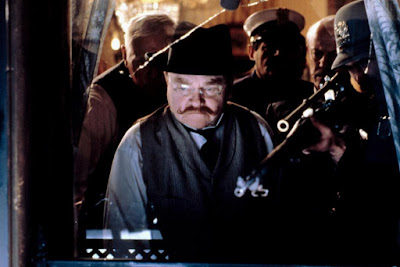Back in the day when Hollywood was grinding out B westerns it wasn't unusual at all to see famous folks of the west in stories that had absolutely nothing to do with their own lives or to see many famous people interacting when they never even met in real life.
Ragtime revives some of that dubious tradition in filming E.L. Doctorow's novel about the Teddy Roosevelt years of the first decade of the last century. Teddy figures into this briefly as does his Vice President Charles Fairbanks. Booker T. Washington is here too, as are the principals of the Stanford White murder, and New York City Police Commissioner Rhinelander Waldo.
It's quite a blend because Roosevelt and Fairbanks ran for re-election in 1904 as Fairbanks is shown delivering a campaign speech. He wasn't even Vice President then, just a Senator from Indiana. Fairbanks was running for Vice President because Roosevelt had no Vice President in his first term. He succeeded to the presidency when Willima McKinley was assassinated.
The Stanford White murder took place in 1906 and was then called the crime of the century. Many such murders right up to O.J. Simpson were given that dubious distinction. And Rhinelander Waldo was not NYPD Police Commissioner until 1910 and he was much younger than James Cagney.
Still and all E.L. Doctorow's book is made into a fine film which got a whole bunch of Academy Award nominations including Best Picture, Best Director for Milos Forman and Supporting player nominations for Howard Rollins, Jr. and Elizabeth McGovern.
The main story is about Coalhouse Walker, Jr. a black ragtime pianist and his Sarah. She has his baby and they'd like to get married. But a whole lot of things, some of them peripherally connected to the true events and people previously mentioned that lead him and a gang to take possession of the Morgan Library and threaten to blow it up.
Howard Rollins was a real tragedy. This was a great start to a short, but brilliant career that included his long running role as Virgil Tibbs in the TV series In the Heat of the Night and the film A Soldier's Story. He died way too young from AIDS contracted from a lot of intravenous drug use.
Elizabeth McGovern is the famous Evelyn Nisbet, the girl on the red velvet swing which was the title of another film that dealt with the Stanford White murder. McGovern's performance is probably closer to the real Evelyn than Joan Collins was in that earlier film. She's basically a goldigger who juggled two men, her husband Harry K. Thaw and her upscale lover, society architect Stanford White. Her circus act led to White's death, Thaw's commitment to an insane asylum and a vaudeville career for her.
Ragtime was eagerly awaited because of the anticipated return of James Cagney to the screen after being off for 19 years. Cagney is clearly aged, but he gets through the role because unlike that television film Terrible Joe Moran, he's not the center of the film, though he's first billed. Note that he's sitting down during most of his performance and when he has to stand the camera is a discreet distance. It's nothing like the bouncing Cagney of old, but light years better than Terrible Joe Moran.
This was also the final joint appearance as it turned for the team that invented the buddy film, James Cagney and Pat O'Brien even though they have no scenes together. O'Brien is Harry K. Thaw's attorney and Mrs. O'Brien plays Thaw's mother under her maiden name of Eloise Taylor. She was an actress before she married Pat, but gave up her career to raise their four children.
Author Norman Mailer plays Stanford White, fulltime architect and hedonist and Robert Joy plays the demented millionaire Harry K. Thaw and both fit the parts perfectly. Maybe one day we will have a definitive film version just concentrating on the murder and it's aftermath for the three principals.
Milos Forman gave us a remarkable evocation of an exciting time in American history. It seemed that America had limitless possibilities then. I doubt they'll be saying that about the first decade of this century...
BRUCE RATING: 9 OUT OF 10
MY REVIEW: 10 OUT OF 10





No comments:
Post a Comment